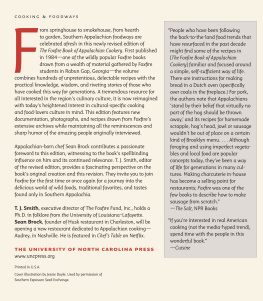Copyright 2018 by The Foxfire Fund, Inc.
All rights reserved. Published in the United States by Anchor Books, a division of Penguin Random House LLC, New York, and distributed in Canada by Random House of Canada, a division of Penguin Random House Canada Limited, Toronto.
Anchor Books and colophon are registered trademarks of Penguin Random House LLC.
Lillie Mulkey West: Inspiring a new generation of folk singers first appeared, in slightly different form, in The Times of Gainesville, Georgia.
Due to limitations of space, permissions to reprint previously published material can be found on .
The Foxfire Fund, Inc.
PO Box 541
Mountain City, GA 30562-0541
706-746-5828
www.foxfire.org
Library of Congress Cataloging-in-Publication Data
Names: Hudgins, Phil, compiler, interviewer. | Phillips, Jessica, 1998 interviewer. | Foxfire Fund, issuing body.
Title: Travels with Foxfire : stories of people, passions, and practices from Southern Appalachia / Phil Hudgins and Foxfire student Jessica Phillips.
Description: New York : Anchor Books, a division of Penguin Random House LLC, [2018]
Identifiers: LCCN 2017056227
Subjects: LCSH: Appalachian RegionCivilization. | Southern StatesCivilization. | Country lifeAppalachian Region. | Country lifeSouthern States. | HandicraftAppalachian Region. | HandicraftSouthern States. | Appalachian RegionSocial life and customs. | Southern StatesSocial life and customs. | InterviewsAppalachian Region. | InterviewsSouthern States.
Classification: LCC F106 .H83 2018 | DDC 975.8dc23
LC record available at https://lccn.loc.gov/2017056227
Anchor Books Trade Paperback ISBN9780525436294
Ebook ISBN9780525436300
Cover design by Walter Cochran of Braizen, LLC
www.anchorbooks.com
v5.3.2
ep
While a great many folks lent their talents to this work, we want to take this opportunity to recognize four individuals for their many years of service to Foxfire. First, Ann Moore, who retired as Foxfires executive director after nearly twenty years in that role and forty years with the organization. This past year, two long-time board members, Janet Rechtman and Hunter Moorman, retired from their posts. Then, Hilton Smith, a long-time staff member, past interim executive director for Foxfire, and one of the educational innovators behind the Foxfire Approach to Teaching and Learning, retired from teaching.
Janet Rechtman first came to Foxfire in 1998 as a consultant through the organizations strategic planning process. Three years later, she joined the board of directors and was shortly thereafter appointed as board chaira position in which she served for some seven years. All told, Janet served on the board for seventeen years.
Hunter Moorman was invited to join the board of directors in 1999. Hunter was a former assistant secretary to the US Department of Education and brought an informed perspective on Foxfires educational programming, specifically teacher development through the Foxfire Approach. In 2009, Hunter was nominated to serve as Foxfires board chairman, a position he held until 2017. In that time, Hunter guided the organization through its strategic plan for 20092015 and helped the organization secure its first NEH (National Endowment for the Humanities) grant in some thirty years.
Hilton Smith was an early adopter of the core practices that would become the Foxfire Approach to Teaching and Learning. He joined the Foxfire staff as an educator in the 1980s and played a pivotal role in developing and defining the approach. Later, Hilton was asked to serve as Foxfires interim executive director as it navigated a difficult transition in administrative leadership. Years later, Hilton was instrumental in coordinating Foxfires partnership with Piedmont College, through which many teachers were educated in the Foxfire Approach.
Ann Moore joined Foxfire as its bookkeeper in 1976 and was named president and executive director in 1999. Ann retired from Foxfire in 2016, leaving behind a legacy of selfless, tireless work for this organization. In 2017, the Gate House, which houses Foxfires museum store and offices, was rededicated as the Ann Moore Gate House, to honor her selfless dedication to Foxfire.
To these individuals and the countless others who have contributed to Foxfire over the years, we dedicate this volume to you.
Contents
Acknowledgments
When I fully retired as senior editor of Community Newspapers, Inc., in April 2015, I wasnt ready to sit down and sort my socks or glue Popsicle sticks together. I wanted a project. I thought of the Foxfire program of Rabun County, Georgia, where I lived for five years while serving as publisher/editor of The Clayton Tribune, a weekly newspaper. I had served on Foxfires community board in the early 1990s and was impressed with the program. For fifty-plus years, hundreds of students in Rabun County have learned valuable skills through Foxfire, which has earned a worldwide reputation, thanks mainly to books and magazines produced by the students themselves.
I visited the Foxfire office on Black Rock Mountain and presented my idea to Ann Moore, then president and executive director of the Foxfire Fund. My proposal was this: I would interview and write stories on people, passions, and practices and compile them for a book, one a bit different from the series Foxfire has published over the years. Ann liked the idea.
In her absence at the next Foxfire board meeting, Barry Stiles, curator of the Foxfire Museum, presented the proposal to board members. The board gave a thumbs-up. Jessica Phillips, then a student at Rabun County High School, was chosen to work with me on the project. This bright young woman did as many interviews as she could work into her busy schedule. I did the rest, gathering stories from five states: Georgia, North and South Carolina, Tennessee, and Kentucky.
You are holding the final product in your hands. It was a lot of work, but, if youll excuse the clich, it was a labor of love. Jessica and I interviewed hunters, folk artists, herbs gatherers, musicians, songwriters, historians, farmers, former moonshiners, water dowsers, stock car racers, television executives, authors, storytellers, cooks, a genealogist, a professor, a mule collector, and even an expert on outhouses. And there were others. We met some interesting people, believe me.
We have a lot of people to thank, some for reading and offering suggestions, some for story ideas, some for encouragement. First, of course, we thank Ann Moore, Barry Stiles, and T. J. Smith, now director of Foxfire; editor Kaye Collins, and members of the Foxfire board for giving Jessica and me this opportunity. Without them, this book would still be only a dream. Id also like to thank editor Tom Pold and Penguin Random House for oversight and publication.
All proceeds from book sales, by the way, go to Foxfire.
Others deserving our thanks include: Johnny Vardeman, Ken Hudgins, Myles Godfrey, Emory Jones, Sharon Hall, cartoonist Jim Powell, Joy Phillips, Teddi Heck, Joseph Doc Johnson, Jack Ogle, Tommy Bowers, Jack Frost, Don Elrod, Barbara McRae, George Thompson, and The Times of Gainesville, Georgia.
Id also like to thank my wife, Shirley, for putting up with my obsession with this book.
Introduction
Its a bit daunting, even for a native son, to sit down and try to define Southern Appalachia. Fortunately, thats not the purpose of this book. The purpose is to capture and preserve as much as possible the culture, wit, and wisdom of the people of this region, people who cling tenaciously to traditions and stories and music and events and food and activities (legal and otherwise) and all those other things fading from reality and into reality TV.












